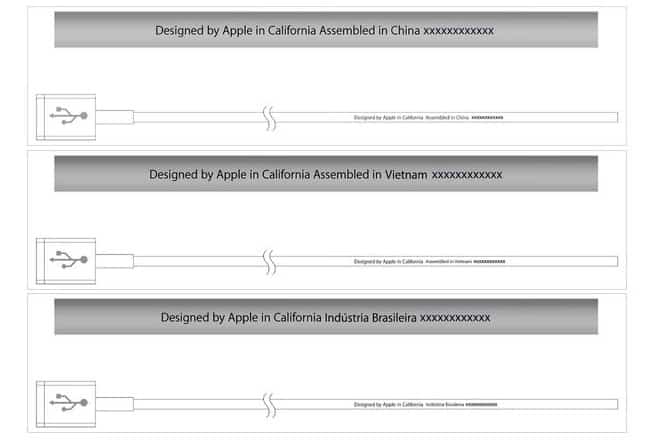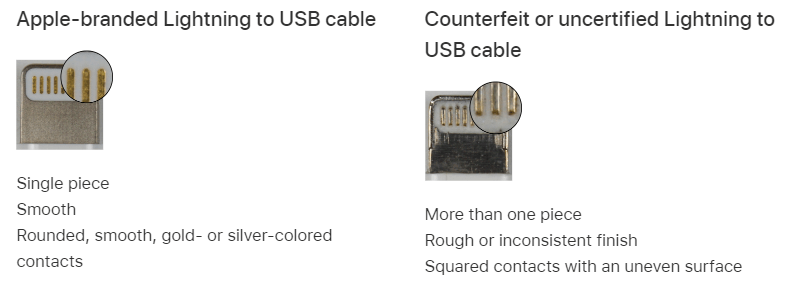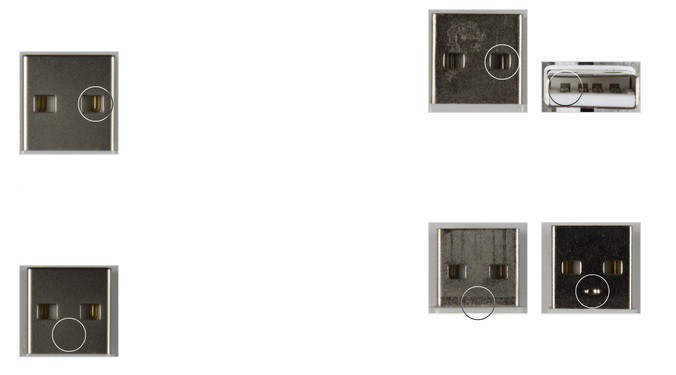Read too: 10 things to do after having your iPhone stolen
1. Inscriptions on the cable
Genuine Apple cables always have inscriptions about where they were produced, but cheap copies do not. In general, entries should be one of those seen in the image below:
If the cable does not have any of this writing, you can be sure that it is not an original Apple product and that it could damage your device. Also, even if the cable has something like this written on it, but has other alterations mentioned later in our list, there is still a good chance that it is a counterfeit iPhone charger.
2. Check the Lightning connector
Another easy way to identify a pirated iPhone charger is by checking the Lighting connector end of the charger cable. On the original model, the connector has a clean metallic look, and smooth, rounded corners, and the contacts are gold plated and fit snugly into the connector.
In the counterfeit model, the connector is darker, it is made up of more than one piece and the contacts are more yellowish and stand out from the rest of the connector. In the image above, it is easier to see the differences. Look not only at the zoomed-in area, but also at the general appearance of the contacts, and compare when choosing to identify whether the charger is fake or certified. Even the low quality of the materials can end up causing the cable to stop working too soon or, in the worst case, that it ends up negatively affecting your smartphone’s battery.
3. Check the USB connector
You can do the same check with the USB port of the charger connector. In the original cable, the latches are well-fitted, the contacts are gold-plated, and the connector surface is completely smooth and consistent.
On fake USB connectors, the latches are unevenly spaced and stand out on the connector, the contacts are silver, and the surface is often mottled or darker. You can check the differences we mentioned in the image above. Essentially, the certified or original iPhone charger values the quality of the materials used and even the appearance of the final product. Meanwhile, pirated products are typically made with cheaper alternatives and don’t go through quality control.
4. Compare with an original
It is to be imagined that if you have an iPhone, you have probably had contact with an original charger for the device. After all, the smartphone itself already comes with an original cable inside the box, but unfortunately no longer the actual power brick. If you still have it around (even if it’s not working), it’s quite possible to make a comparison between it and the model you want to buy. The type of material of the charger and the cables will be quite different. Overall, with the original model in hand, it will be really easy to distinguish whether the cable you are buying is certified and original or not. Check the quality and malleability of the cable itself to the construction and composition of the connectors to make sure you are not buying a fake product.
5. Price
As we already mentioned, no Apple product is cheap, so you always have to be wary of models sold for a very low price, even if they are used. Even because, in this second case, a very cheap used cable can be a great indication that something may not be working exactly as it should, it’s good to be even more alert. The cables alone can cost more than 19 USD on Apple’s official website, so a used one can usually cost around 10 USD easily. New or used cables for less than this price are usually not original or have problems and you should avoid them. The main difference between paying a more expensive price and buying a counterfeit iPhone charger is that the second one does not go through strict quality control to be considered ready for sale. Apple charges a lot but values the quality of materials and assembly of its products. However, the increase in price is also due to artificial inflation caused by the proprietary lightning connector, as type-C cables by reputable third-party brands are MUCH cheaper than lighting cables. Even if you want to buy an original cable directly from the Apple website, just access the store through this link! Also, find on AppTuts:
Did you like the iPhone charger tips?
Did you take advantage of our tips to know how to identify when an iPhone charger is fake? So share this article with friends who also use iPhones to help them avoid damaging their phones with a counterfeit cable or brick!


